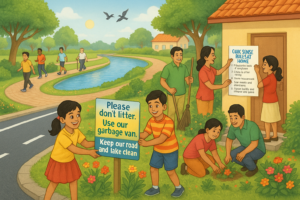By Pranti Pradhan
Civic Sense Begins at Home—and Grows Beyond

Near Siyona and Rihan’s house, there was a small park. People came there every morning and evening to walk, jog, and exercise. Right in front of the park, there was a big lake. But the lake was not beautiful—it was full of garbage, plastic bags, and dirty water. It smelled bad, and no birds or fish were seen anymore.
Next to the park, the road was broken and dusty. Rainwater made big potholes. People threw garbage—old bags, bottles, leftover food—on the roadside. Slowly, the area became messy and smelly.
Siyona and Rihan felt sad every time they passed by. “Why do people throw garbage here? Why doesn’t anyone clean it?” they wondered.
Their mother, Preety, also noticed this and often sighed. “People don’t realize that public places are like our shared home,” she would say.
Then, one day, something changed. Workers came with machines. They cleaned the lake, removed garbage, and carried it away in big trucks. Slowly, the water looked cleaner, and a walking path was built around the lake.
At the same time, the broken road was repaired. Fresh tar was laid, and white lines were painted. The road became smooth and easy to walk or drive on.
Everyone was happy. Preety smiled, “Finally, our neighborhood looks better.”
But the happiness didn’t last long. Some people still threw garbage on the roadside, even though a garbage van came every morning ringing its bell. One day, Siyona saw a man throwing a plastic bag near the lake and felt angry. “Why are people still doing this?”
That evening, Preety sat with the children and said, “Do you see how hard the workers tried to clean everything? Yet, some people don’t help. Civic sense doesn’t only mean following rules in parks or roads—it starts inside our homes.”
Vikram, their father, added, “If we don’t care for our home, how can we care for outside? Let’s begin with ourselves.”
Inspired, the family made a simple chart and stuck it on the fridge. It said:
Our Civic Sense Rules at Home
Put things back in their place
Clean up after eating
Share housework
Save water and electricity
Speak kindly and respect everyone
The next morning, Siyona and Rihan helped clean the balcony, put their toys back, and even reminded each other to switch off lights.
Later, they made a signboard and placed it at the park gate. It read:
“Please don’t litter. Use the garbage van. Keep our road and lake clean.”
They politely reminded neighbors to wait for the garbage van. Every time they passed the lake, they picked up small bits of trash and threw them in the bin. Their efforts began to inspire others.
Mrs. Sharma, a neighbor, noticed their clean and organized home and asked Preety, “How do you manage this with two kids?”
Preety replied, “We follow small civic sense rules together as a family.”
Inspired, Mrs. Sharma and her son Kabir made their own chart. Kabir started keeping his room tidy, helping water plants, and throwing wrappers in the bin.
When Siyona and Rihan visited Kabir’s house, they saw the chart and smiled. “Hey! You have the same rules as us!”
“Yes,” said Kabir. “We learned it from you.”
Soon, more neighbors joined in. Garbage was thrown only in bins. Stairways were kept clean. Lights were switched off when not in use. The lake slowly began attracting birds again, and flowers bloomed along the walking path.
Mrs. Sharma said one day, “Civic sense is like a smile—it spreads from one home to another!”
Preety agreed, “If every home cares, the whole community will care.”
Siyona, Rihan, and Kabir realized something powerful: big changes begin with small steps. It’s not just about rules, but about care—for our home, our surroundings, and our future.
And every time they walked past the park and lake, they felt proud, knowing that their small efforts were part of something big.
🌟Moral of the Story🌟
Big changes begin with small steps. Civic sense starts at home and grows when we care—for our surroundings, for each other, and for the world we share.



